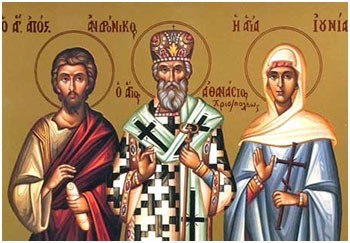Apostle Andronicus of the Seventy and his fellow-laborer, Junia (17 May)


Saint Andronicus Apostle of the Seventy and Saint Junia were relatives of the holy Apostle Paul. They labored much, preaching the Gospel to pagans. Saint Paul mentions them in his Epistle to the Romans: “Salute Andronicus and Junia, my kinsmen and fellow prisoners, who are of note among the Apostles, who also were in Christ, before me” (Romans 16:7).
Saint Andronicus was made Bishop of Pannonia, but his preaching also took him and Saint Junia to other lands, far from the boundaries of his diocese. Through the efforts of Saints Andronicus and Junia the Church of Christ was strengthened, pagans were converted to the knowledge of God, many pagan temples closed, and in their place Christian churches were built. The service in honor of these saints states that they suffered martyrdom for Christ.
In the fifth century, during the reign of the emperors Arcadius and Honorius, their holy relics were uncovered on the outskirts of Constantinople together with the relics of other martyrs at the gate of Eugenius (February 22).
It was revealed to the pious cleric Nicholas Kalligraphos that among the relics of these seventeen martyrs were the relics of the holy Apostle Andronicus. Afterwards, a magnificent church was built on this spot.
Andronicus was one of the Seventy Apostles. He was a kinsman of St. Paul, as Paul himself wrote [Greet Andronicus and Junia, my relatives and my fellow prisoners; they are prominent among the apostles and they were in Christ before me (Romans 16:7)].
Paul also mentions St. Junia, Andronicus’s helper. Andronicus was appointed bishop in Pannonia but did not remain in one place; rather he preached the Gospel throughout Pannonia. With St. Junia, he succeeded in converting many to Christ and destroyed many idolatrous temples.
They both possessed the power of grace to work miracles, through which they drove out demons from men and healed every type of disease and illness. They both suffered for Christ and thus received a twofold wreath: that of apostles and martyrs. Their holy relics were discovered in the regions of Eugenius (February 22).
Source: oca.org





